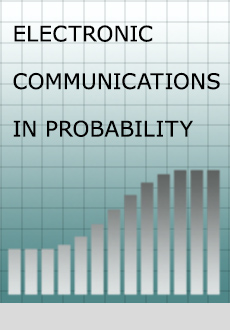Abstract
Biggins [Uniform convergence of martingales in the branching random walk. Ann. Probab., 20(1):137–151, 1992] proved local uniform convergence of additive martingales in $d$-dimensional supercritical branching random walks at complex parameters $\lambda $ from an open set $\Lambda \subseteq \mathbb{C} ^d$. We investigate the martingales corresponding to parameters from the boundary $\partial \Lambda $ of $\Lambda $. The boundary can be decomposed into several parts. We demonstrate by means of an example that there may be a part of the boundary, on which the martingales do not exist. Where the martingales exist, they may diverge, vanish in the limit or converge to a non-degenerate limit. We provide mild sufficient conditions for each of these three types of limiting behaviors to occur. The arguments that give convergence to a non-degenerate limit also apply in $\Lambda $ and require weaker moment assumptions than the ones used by Biggins.
Citation
Konrad Kolesko. Matthias Meiners. "Convergence of complex martingales in the branching random walk: the boundary." Electron. Commun. Probab. 22 1 - 14, 2017. https://doi.org/10.1214/17-ECP50
Information





